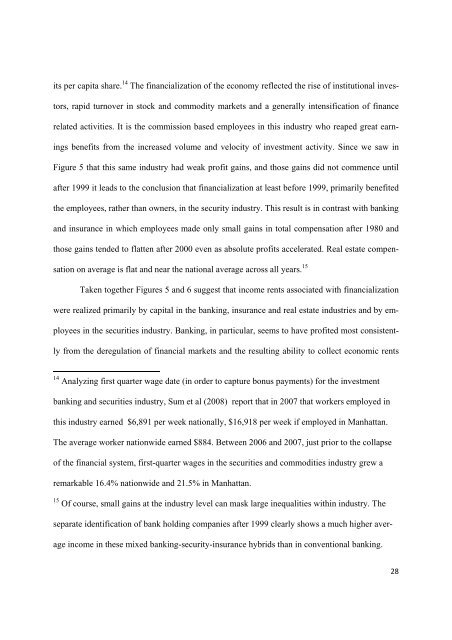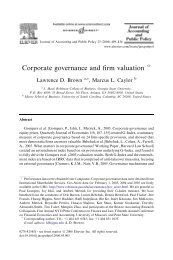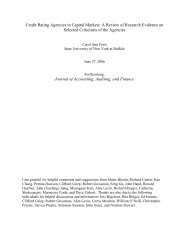Income Dynamics, Economic Rents and the Financialization of the ...
Income Dynamics, Economic Rents and the Financialization of the ...
Income Dynamics, Economic Rents and the Financialization of the ...
Create successful ePaper yourself
Turn your PDF publications into a flip-book with our unique Google optimized e-Paper software.
its per capita share. 14 The financialization <strong>of</strong> <strong>the</strong> economy reflected <strong>the</strong> rise <strong>of</strong> institutional inves-<br />
tors, rapid turnover in stock <strong>and</strong> commodity markets <strong>and</strong> a generally intensification <strong>of</strong> finance<br />
related activities. It is <strong>the</strong> commission based employees in this industry who reaped great earn-<br />
ings benefits from <strong>the</strong> increased volume <strong>and</strong> velocity <strong>of</strong> investment activity. Since we saw in<br />
Figure 5 that this same industry had weak pr<strong>of</strong>it gains, <strong>and</strong> those gains did not commence until<br />
after 1999 it leads to <strong>the</strong> conclusion that financialization at least before 1999, primarily benefited<br />
<strong>the</strong> employees, ra<strong>the</strong>r than owners, in <strong>the</strong> security industry. This result is in contrast with banking<br />
<strong>and</strong> insurance in which employees made only small gains in total compensation after 1980 <strong>and</strong><br />
those gains tended to flatten after 2000 even as absolute pr<strong>of</strong>its accelerated. Real estate compen-<br />
sation on average is flat <strong>and</strong> near <strong>the</strong> national average across all years. 15<br />
Taken toge<strong>the</strong>r Figures 5 <strong>and</strong> 6 suggest that income rents associated with financialization<br />
were realized primarily by capital in <strong>the</strong> banking, insurance <strong>and</strong> real estate industries <strong>and</strong> by em-<br />
ployees in <strong>the</strong> securities industry. Banking, in particular, seems to have pr<strong>of</strong>ited most consistent-<br />
ly from <strong>the</strong> deregulation <strong>of</strong> financial markets <strong>and</strong> <strong>the</strong> resulting ability to collect economic rents<br />
14 Analyzing first quarter wage date (in order to capture bonus payments) for <strong>the</strong> investment<br />
banking <strong>and</strong> securities industry, Sum et al (2008) report that in 2007 that workers employed in<br />
this industry earned $6,891 per week nationally, $16,918 per week if employed in Manhattan.<br />
The average worker nationwide earned $884. Between 2006 <strong>and</strong> 2007, just prior to <strong>the</strong> collapse<br />
<strong>of</strong> <strong>the</strong> financial system, first-quarter wages in <strong>the</strong> securities <strong>and</strong> commodities industry grew a<br />
remarkable 16.4% nationwide <strong>and</strong> 21.5% in Manhattan.<br />
15 Of course, small gains at <strong>the</strong> industry level can mask large inequalities within industry. The<br />
separate identification <strong>of</strong> bank holding companies after 1999 clearly shows a much higher aver-<br />
age income in <strong>the</strong>se mixed banking-security-insurance hybrids than in conventional banking.<br />
28







